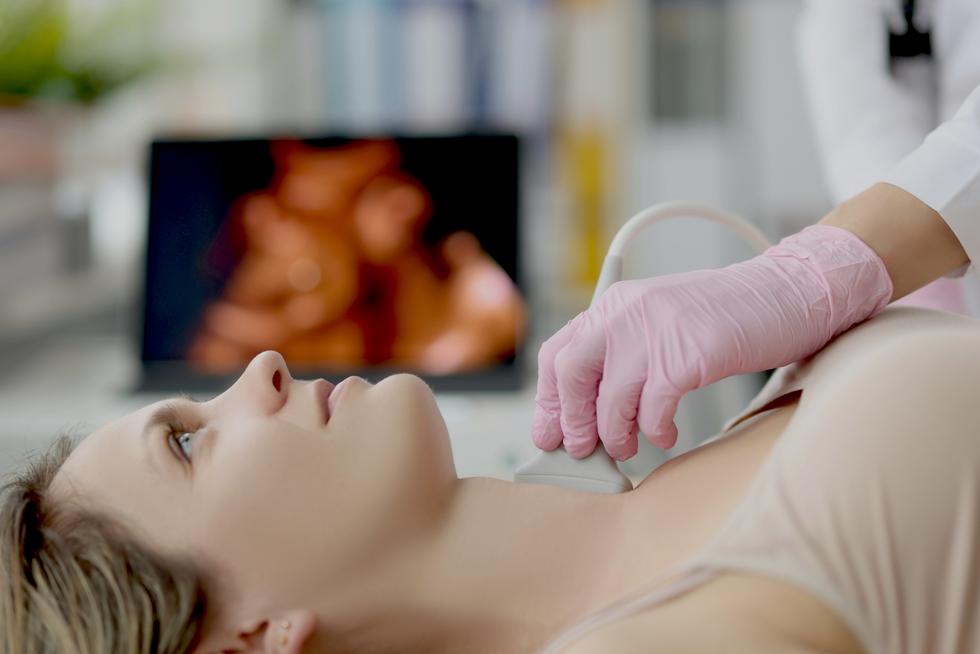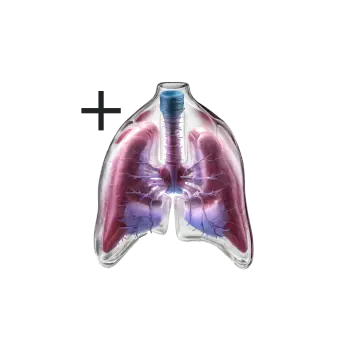Quick version
The thyroid is a small gland in your neck that controls your metabolism, energy, and how your body works. It produces the hormones T3 and T4, which affect almost every organ in your body. If your thyroid doesn't produce enough hormones (hypothyroidism), you may feel tired and sluggish. If it produces too much (hyperthyroidism), you may experience palpitations and anxiety. Common causes include autoimmune diseases such as Hashimoto's or Graves'. A blood test can show if your thyroid is working properly.
What is the thyroid?
The thyroid, or thyreoidea, is a small but important gland that sits like a butterfly across the front of your neck, just below your Adam's apple. Despite its modest size, it has a huge impact on how you feel every day – from your energy and metabolism to how fast your heart beats and how your body grows and develops. By producing important hormones, the thyroid controls almost every cell in your body and keeps many of your body's most important functions in balance.
Thyroid hormones
The thyroid gland affects the body by producing hormones that act as the body's own "accelerator" and "brake" for metabolism. These hormones control how quickly or slowly your organs work and how efficiently your body uses energy. Without a good balance of thyroid hormones, the body's systems do not function properly - everything from the heart and brain to muscles and digestion is affected.
- Thyroxine (T4) is the most abundant hormone in the blood and acts as a "storage hormone" that is converted to active T3 when needed.
- Triiodothyronine (T3) is the biologically active hormone that directly affects the body's cells.
- Calcitonin - Helps regulate calcium in the blood, but does not have as much of an impact on metabolism.
To produce T3 and T4, the thyroid gland needs iodine, a mineral that we get through our diet, for example through salt, fish and dairy products.
How does the body control the thyroid gland?
The thyroid gland is part of an advanced feedback system called the hypothalamic-pituitary-thyroid axis.
- The hypothalamus in the brain secretes TRH (thyrotropin-releasing hormone).
- TRH stimulates the pituitary gland to release TSH (thyroid-stimulating hormone).
- TSH tells the thyroid gland to produce more T4 and T3.
- When the levels of T4 and T3 in the blood are sufficient, TRH and TSH are reduced, which balances the system.

What do thyroid hormones do in the body?
Thyroid hormones act as the body's internal engine, affecting almost every organ and tissue. They determine how quickly cells work, how much energy is used, and how efficiently the body converts nutrients into power. When hormone levels are balanced, you feel energized, mentally sharp, and your body functions properly. But if levels are too high or too low, everything from your heart rate to your digestion and mood can be affected.
- Brain: Affects mood, cognition, and mental energy.
- Heart: Regulates heart rate and blood pressure.
- Muscles and joints: Contribute to strength and endurance.
- Skin and hair: Affects skin moisture and hair quality.
- Intestines: Controls the speed of digestion.
- Fertility and menstruation: Thyroid disorders can cause irregular periods or infertility.
Common Thyroid Diseases
The thyroid gland can sometimes function less well than normal, causing it to produce too little or too much hormone. Both conditions affect the body's metabolism and cause various symptoms. The most common diseases are hypothyroidism (underactive thyroid) and hyperthyroidism (overactive thyroid), which often have an autoimmune cause.
Hypothyroidism – underactive thyroidWhen the thyroid gland does not produce enough hormone.
- Symptoms: Fatigue, weight gain, feeling cold, depression, dry skin, slow pulse.
- Cause: Most common is Hashimoto's thyroiditis, an autoimmune disease where the immune system attacks the thyroid gland.
- Diagnosis: High TSH, low free T4.
- Treatment: Levothyroxine (synthetic T4).
When the thyroid gland produces too much hormone.
- Symptoms: Palpitations, weight loss, feeling hot, anxiety, muscle weakness.
- Cause: Often Graves' disease, an autoimmune disease where the immune system stimulates the thyroid gland to become overactive.
- Diagnosis: Low TSH, high free T4 and/or T3.
- Treatment: Thyrostatics (drugs that slow down hormone production), radioiodine, or surgery.
Goiter is a collective term for an enlarged thyroid gland, with or without a disorder in hormone production.
- Can be caused by iodine deficiency, autoimmune diseases or nodules in the thyroid gland.
- Hashimoto's thyroiditis, which is the most common cause of hypothyroidism. Often causes chronic inflammation of the thyroid gland.
- Graves' disease is the most common cause of hyperthyroidism. Can also cause eye problems (Graves' ophthalmopathy).
How do you test your thyroid?
If you suspect a thyroid disorder, a simple blood test is often enough to get a clear picture of how your thyroid is functioning. By analyzing specific hormones and antibodies in the blood, your doctor can determine whether your thyroid is producing the right amount of hormone, and whether there is an underlying autoimmune disease. These tests are important both for making a diagnosis and for monitoring treatment over time.
- TSH – the most important test to assess whether the thyroid gland is functioning normally.
- T4 and T3 – show how much active hormone is available.
- TPO antibodies – indicate autoimmune inflammation (e.g. Hashimoto's).
- TRAK – antibodies that indicate Graves' disease.





















